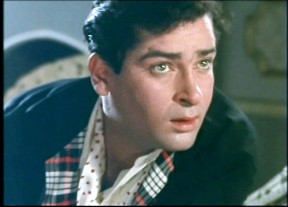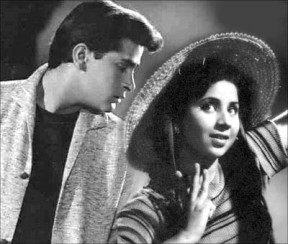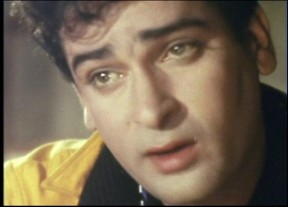It was a toss between Shankar Jaikishan and RD Burman. The film was Teesri Manzil and it was left to Shammi Kapoor to decide who he wanted to compose music for the film. It was an unprecedented privilege for a Hindi film hero but nothing could be denied to Shammi Kapoor in the 60s. In an industry crowded with the greatness of Dilip Kumar, the distinctly unpredictable Dev Anand, the prolific Raj Kapoor, the gravitas of Guru Dutt, the golden hits of Rajendra Kumar and emerging star power of younger actors like Dharmendra, Shammi Kapoor was the master of his own genre. The genre of the dancing soul. Of love set free from the formality of understatement.
The genre of exuberance, vitality, unrestricted joie-de-vivre that made the audience want to tumble down powdery snow slopes with a rebelliously joyful Yahooo. Shammi Kapoor was to the Hindi film song what Elvis was to Rock ‘n’ Roll. He did not compose music but he understood it better than most of his peers. He brought to the Hindi film song, an ‘ada,’ a manner, a flamboyant detailing that had never been seen before. Every nuance of a song, its lyrics, its musical interludes came alive in Shammi Kapoor’s body. His whiskey eyes could smoulder with passion, or grow moistly tender or sparkle with mischief. From a Devdas, the Hindi film hero became a Junglee, a Budtameez, a Pagla Kahin Ka.
His head and shoulders and arms grew taut, angular, bristling at will and seemed to be connected to invisible but magnetically charged cables that drew the heroine helplessly to him at the end of every song. That head toss, that half smile, the intoxicated gaze, the dancing curl on his forehead, a playfully predatory walk all hinted at a sensuality, that had rarely been seen on the screen.
Yet, there was never a hint of disrespect or distasteful innuendo in his body language. With Shammi Kapoor, love stopped being a thing of sacrifice and pain and became a celebration, a coming together of man, his woman and beautiful lakes, mountains, valleys and rivers and music. He was never taken seriously as an actor but in films like Bramhachari and Pagla Kahin Ka, there was a hint of the minimalist in Shammi Kapoor. Someone who could be less dazzling and more introspective.
His personal life was however not as uncomplicated as his films. In 1955, Shammi met and fell deeply and impetuously in love with Geeta Bali. Almost nine years and two babies later, Geeta died tragically of small pox, leaving Shammi distraught. A self-destructive phase later, he married Neela Devi who brought a semblance of order and peace to his life. In his later years, he put on weight, became deeply spiritual, calm and was also possibly the first Indian celebrity to understand the power of the Internet as a medium of communication.
But we have digressed. Because he had a vast knowledge of music and an intuitive understanding of the kind of music that would work cinematically, he was given the freedom by his directors to choose songs and even music directors. So it came to pass that he had his first meeting with a young RD Burman before Teesri Manzil could go on the floors. RD played the first few notes of Deewana Mujh Sa Nahin and Shammi Saab finished the rest of the tune because he knew it was inspired by a Nepali folk song. RD was shocked by the extent of his musical knowledge and Shammi Saab saw in a young, restless music director, the capacity to push music out of the box of tired conventions.
The two hit it off and the rest is musical history. Teesri Manzil is possibly the best musical of a certain genre ever made in the history of Hindi films and Shammi Kapoor relished every song, every drum roll, every saxophone lilt, every explosion of trumpets. He was one of the few actors in the industry who could choreograph their own movements because who could have taught Shammi Kapoor to dance like Shammi Kapoor? So he danced and sang and lived Teesri Manzil and so did we. When Shammi Saab made his own film Manoranjan, it was RD he turned to and they remained life long friends.
His transformation from a sensual, erotically charged lover to a cuddly family patriarch was graceful and effortless. Some of my favourite Shammi Kapoor performances are in Vidhata, Ahista Ahista, Prem Rog, Yeh Wada Raha, Ijazat and counting. There was obviously a deep, compassionate, wise old man within who communicated himself to the audience through every role. In a family of stalwarts like Prithvi Raj Kapoor, Raj Kapoor and Shashi Kapoor, Shamsher Raj Kapoor was truly his own man. Inimitable and unforgettable. He is gone and yet there he is. Just a click and a song and a memory away.
Reema Moudgil is the author of Perfect Eight (http://www.flipkart.com/b/books/perfect-eight-reema-moudgil-book-9380032870?affid=unboxedwri )









…haan, hum tumhe yun bhulana paayenge.
Jab kabhi bhi sunnegey geet tere
Sanng sanng hum bhi gungunaenge…
Thank you for the tribute to a very special actor. He was not the greatest actor in terms of talent, but he was one of a kind. An original. I was always amused how critical people were about him and yet every time his movie was released, it would run to packed houses. Some said he was not a serious actor. If cinema is entertainment then, if it is about transporting the audience, then he was an entertainer par excellence. And for those who feel cinema is about sending out a message (not that I agree with this), then his was one of the best. How to love someone with all your heart and soul, holding nothing back. Every immortal song he sang seemed written for just him, he brought the words to life with his eyes as no other.
He was the John Donne of Indian cinema. Just as Donne proved with his triumphant exuberance and giddy happiness that great poetry does not have to be about heartbreak or grief, and that it is not always our saddest thoughts that are our sweetest songs, Shammi celebrated the sheer joy and magic of loving and being loved. RIP
thank you asma and rani, thank you for a beautiful tribute..it deserves to be published…noone could have said it better.
..marke bhi dekha
mar na sake tum,
dil ki lagi ne tumko bachaya,
teri nazar ka
jaado hai shayad,
jisne tumhe fir zinda banaya
Shammi saab ur songs, ur eyes, ur charms will never let you die. U’ll always remain in our hearts and ur songs will keep showering immence joy in our lives